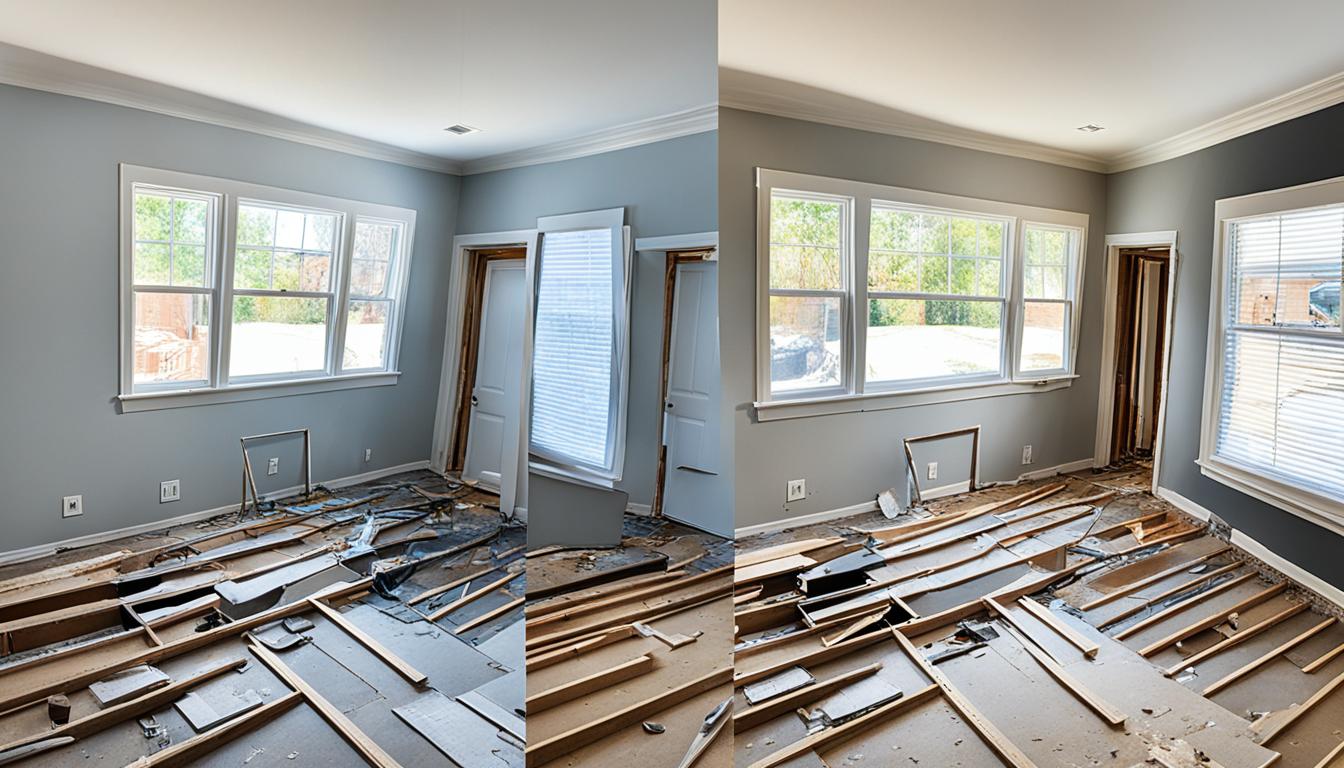As a homeowner, you take pride in maintaining your property and ensuring its longevity. But have you ever wondered what sets home repairs apart from renovations? Are they merely two sides of the same coin, or do they have distinct purposes and outcomes? In this article, we will explore the key differences between home repairs and renovations, helping you gain a deeper understanding of these essential aspects of home maintenance.
Key Takeaways:
- Repairs focus on fixing or restoring damaged or malfunctioning elements of a home.
- Renovations involve making significant changes or upgrades to a home’s structure, design, or appearance.
- Repairs are essential for maintaining the functionality and safety of a property, while renovations aim to enhance aesthetics and functionality.
- Both repairs and renovations can impact the value of a property, but it’s crucial to consider the return on investment for renovations.
- Legal considerations and permits may be required for certain repairs and renovations, depending on the nature and scope of the work.
Understanding Home Maintenance: Repairs vs. Renovations
To understand the difference between repairs and renovations, it’s important to start with their definitions and purposes. Repairs refer to fixing or restoring something that is damaged, broken, or malfunctioning in a home. They are usually done to maintain the functionality and safety of the property. On the other hand, renovations involve making significant changes or upgrades to a home’s structure, design, or appearance. Renovations are typically undertaken to improve the aesthetics, comfort, or functionality of the property.
Key Characteristics of Home Repairs
When it comes to home repairs, there are various types of common repairs that homeowners should be familiar with. These repairs play a crucial role in maintaining the safety and livability of a home, preventing further damage, and ensuring that all systems are in proper working order. Regular maintenance and timely repairs can help homeowners avoid costly damage and extend the lifespan of their property.
Some of the most common types of home repairs include:
- Plumbing repairs: Fixing plumbing issues such as leaking pipes, clogged drains, or malfunctioning fixtures is essential to prevent water damage and maintain proper sanitation.
- Electrical repairs: Addressing electrical issues, such as faulty wiring, circuit breaker problems, or power outages, is crucial for both safety and convenience in a home.
- Structural repairs: Repairing structural damage, such as cracks in walls, sagging floors, or damaged foundation, is vital to ensure the stability and integrity of a home.
- Roof and wall repairs: Patching up roofs or walls, fixing leaks, or replacing damaged shingles or siding are important repairs to protect a home from water infiltration and maintain its energy efficiency.
- Appliance and equipment repairs: Fixing malfunctioning appliances, heating, ventilation, and air conditioning (HVAC) systems, or other household equipment is essential for the comfort and functionality of a home.
By addressing these common home repairs promptly, homeowners can prevent the progression of issues and avoid the need for more extensive and costly repairs down the line. Additionally, regular maintenance and timely repairs can help homeowners safeguard their investment and preserve the value of their property.
| Type of Home Repair | Description |
|---|---|
| Plumbing repairs | Fixing issues with pipes, drains, and fixtures to prevent water damage and maintain sanitation. |
| Electrical repairs | Addressing electrical issues to ensure safety and convenience in a home. |
| Structural repairs | Repairing damage to walls, floors, or foundation to maintain stability and integrity. |
| Roof and wall repairs | Patching up roofs, fixing leaks, or replacing damaged shingles or siding to protect against water infiltration and maintain energy efficiency. |
| Appliance and equipment repairs | Fixing malfunctioning appliances, HVAC systems, or other household equipment for comfort and functionality. |
Exploring Home Renovations
Home renovations offer homeowners the opportunity to transform their living spaces and personalize their homes. Popular renovation projects include kitchen remodels, bathroom upgrades, basement finishing, and adding additional rooms. Renovations can increase the aesthetic appeal, functionality, and market value of a property. However, they are typically more time-consuming, expensive, and disruptive compared to repairs. It’s important to carefully plan and budget for renovations to achieve desired outcomes.
| Common Home Renovations | Impact of Renovations |
|---|---|
| Kitchen remodels | Enhance functionality and value |
| Bathroom upgrades | Improve comfort and appeal |
| Basement finishing | Expand living space |
| Adding additional rooms | Increase property value |
The Impact of Repairs and Renovations on Property Value
Both repairs and renovations can have a significant impact on the value of a property. Understanding how these home improvement activities affect the market value of a home is crucial for homeowners who want to make informed decisions about their investments.
Addressing necessary repairs and maintaining a home in good condition is essential for preserving its value and avoiding depreciation. When potential buyers assess a property, they take into consideration the condition of the house and the cost of any necessary repairs. Homes that have been well-maintained and are free from major issues will generally have a higher market value compared to those in need of extensive repairs.
Renovations, on the other hand, can provide opportunities for increasing a property’s market value. Strategic renovations that improve the functionality, aesthetics, or energy efficiency of a home can make it more appealing to potential buyers. Kitchen remodels, bathroom upgrades, and adding additional rooms are common renovation projects that can significantly enhance the value of a property. These renovations can make a home more desirable and increase its marketability, attracting buyers who are willing to pay a premium.
However, it’s important to note that not all renovations yield a positive return on investment. Homeowners should carefully consider the local real estate market and consult with professionals, such as real estate agents or appraisers, before undertaking major renovation projects. Factors such as the location, the target market, and the cost of the renovations should all be taken into account to ensure that the investment will result in a noticeable increase in property value.
| Repairs | Renovations |
|---|---|
| Address necessary repairs to maintain property value | Strategic renovations can increase market value |
| Prevent depreciation by keeping the property in good condition | Improve functionality, aesthetics, and energy efficiency |
| Important for attracting buyers and commanding a higher price | Make the property more desirable and marketable |
| Can add up over time, impacting the overall value of the property | Should be carefully planned to ensure a positive return on investment |
Legal Considerations and Permissions
When undertaking repairs or renovations, it’s important to consider the legal requirements and permissions. Some repairs may not require permits, especially if they are minor and don’t involve major structural changes. However, certain renovations, such as additions or significant alterations, may require building permits and adherence to local regulations. Homeowners should familiarize themselves with the necessary permits and consult with local authorities or professionals to ensure compliance with the law.
| Permits for Repairs | Permits for Renovations | Legal Considerations for Home Improvements |
|---|---|---|
| Minor repairs like fixing a leaky faucet or replacing a light fixture may not require permits. | Renovations that involve structural changes, electrical or plumbing work, or additions often require building permits. | Ensure compliance with local building codes and regulations. |
| If unsure, contact the local building department or a licensed contractor for guidance. | Permits ensure that the work meets safety standards and is within zoning regulations. | Obtaining permits can protect homeowners from fines or legal issues in the future. |
| Always follow manufacturer guidelines and best practices when performing repairs. | Professional contractors can often handle the permit process on behalf of homeowners. | Consider hiring a professional for complex renovations to ensure compliance and quality work. |
Conclusion
In conclusion, repairs and renovations play vital roles in the maintenance and improvement of homes. Repairs are focused on addressing specific issues to ensure the functionality and safety of a property, while renovations involve significant changes that enhance both aesthetics and functionality. Understanding the difference between repairs and renovations is essential for homeowners to make informed decisions and prioritize their home improvement projects.
By considering factors such as the impact on property value, legal requirements, and their own goals, homeowners can effectively plan and execute repairs and renovations to enhance their living spaces. Repairs are crucial for maintaining the value and integrity of a property, preventing further damage, and ensuring a safe and livable environment. On the other hand, renovations offer opportunities to transform and personalize a home, increasing its market value and improving the overall quality of life.
It is important for homeowners to approach repairs and renovations with careful consideration, as well as consult with professionals when necessary. This will help ensure that the chosen projects align with their goals and adhere to local regulations. By understanding the distinctions between repairs and renovations and weighing the potential impact on property value, homeowners can make informed decisions that lead to successful home improvement endeavors.
FAQ
What is the difference between repairs and renovations?
Repairs involve fixing or restoring something that is damaged or malfunctioning in a home, while renovations involve making significant changes or upgrades to a home’s structure, design, or appearance.
What is the purpose of repairs?
The purpose of repairs is to maintain the functionality and safety of a property by fixing or addressing specific issues or damages.
What is the purpose of renovations?
The purpose of renovations is to improve the aesthetics, comfort, or functionality of a property by making significant changes or upgrades.
What are some common types of home repairs?
Common types of home repairs include addressing plumbing issues, repairing electrical systems, fixing structural damage, and patching up roofs or walls.
What are some common home renovations?
Common home renovations include kitchen remodels, bathroom upgrades, basement finishing, and adding additional rooms or living spaces.
How can repairs and renovations impact property value?
Addressing necessary repairs helps to maintain the value of a property, while strategic renovations that improve aesthetics or functionality can increase its market value.
Are permits required for repairs?
Permits may not be required for minor repairs that don’t involve major structural changes, but it’s important to check local regulations to ensure compliance.
Are permits required for renovations?
Certain renovations, such as additions or significant alterations, may require building permits and adherence to local regulations.
How can homeowners ensure compliance with legal requirements?
Homeowners should familiarize themselves with the necessary permits and consult with local authorities or professionals to ensure compliance with the law.
What should homeowners consider when planning repairs and renovations?
Homeowners should consider the impact on property value, their specific goals, and consult with professionals to effectively plan and prioritize their home improvement projects.








